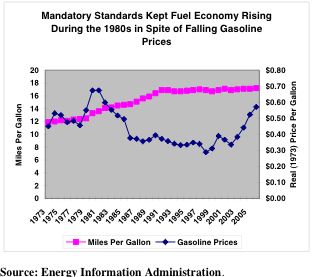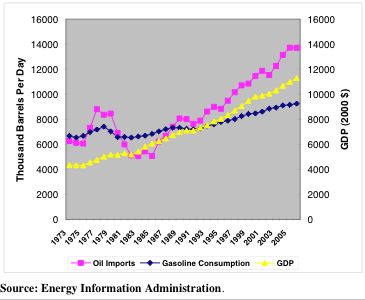
Now that the speculative bubble in commodities has burst and with the global economy moving into recession, crude oil and gasoline prices are plummeting. Wall Street and policy analysts are scrambling to adjust their bullish predictions of a few months ago and issuing warnings that low prices may lead oil companies to cut back on their investments, setting the stage for a price spike in the future. It is ironic that Wall Street always looks for reasons to predict high prices and that oil companies are slow to launch projects when prices rise, but quick to cut them when prices fall.
Buried in some of the stories is the most important public policy implication of the current situation. If the supply-side cannot be counted on to keep the pressure on gasoline markets, it's the demand side we must rely on, not a recession, but a policy to promote fuel economy. Now is the moment to ratchet up fuel economy standards.
As an article in the Wall Street Journal put it: "It is the early 1980s that offer a more-useful reference point. Then, the U.S. weathered a deep recession and world oil prices declines four years running on a conservation push and after spiking gasoline prices."
The "conservation push" came from the fuel economy standards that were put in place in the mid 1970s in response to the Arab Oil embargo. This is what kept the fuel efficiency of the vehicle fleet rising through the 1980s, even though gasoline prices plummeted in real terms. It was only in the late 1980s, when the automakers convinced Congress to stop increasing the standard that progress on fuel economy ceased.  While the oil industry may sees the early 1980s as "dark days," repeating the 1980s in the gasoline market in the decade ahead would not be a bad thing for consumers or the nation. Not only were prices declining in real terms, but increasing fuel economy kept consumption and imports relatively flat. Over the 1980s, gross domestic product grew almost four times as fast as gasoline consumption. The problem was that we did not sustain our commitment to increasing fuel economy standards in the 1990s.
While the oil industry may sees the early 1980s as "dark days," repeating the 1980s in the gasoline market in the decade ahead would not be a bad thing for consumers or the nation. Not only were prices declining in real terms, but increasing fuel economy kept consumption and imports relatively flat. Over the 1980s, gross domestic product grew almost four times as fast as gasoline consumption. The problem was that we did not sustain our commitment to increasing fuel economy standards in the 1990s.  Now, when prices are falling, is the most important moment to stand firm on policies that reduce energy consumption and policy makers have the perfect opportunity to show their resolve. The Energy Independence and Security Act of 2007 restarted the process of increasing fuel economy standards and authorized $25 billion in support to help automakers improve the efficiency of their vehicles. The standards set by the outgoing Bush administration are far too low and entirely inconsistent with the aggressive energy policy President-elect Obama campaigned for. Raising the standards and making sure the money directed to fuel economy is used for those purposes (or even increased), would help consumers, the automakers, the economy, and the nation to break its dependence on imported oil. The failure to product fuel-efficient vehicles is a big part of the problem in the U.S. auto industry. Retooling to produce more efficient vehicles is part of the solution for the industry, consumers and the nation.
Now, when prices are falling, is the most important moment to stand firm on policies that reduce energy consumption and policy makers have the perfect opportunity to show their resolve. The Energy Independence and Security Act of 2007 restarted the process of increasing fuel economy standards and authorized $25 billion in support to help automakers improve the efficiency of their vehicles. The standards set by the outgoing Bush administration are far too low and entirely inconsistent with the aggressive energy policy President-elect Obama campaigned for. Raising the standards and making sure the money directed to fuel economy is used for those purposes (or even increased), would help consumers, the automakers, the economy, and the nation to break its dependence on imported oil. The failure to product fuel-efficient vehicles is a big part of the problem in the U.S. auto industry. Retooling to produce more efficient vehicles is part of the solution for the industry, consumers and the nation.
